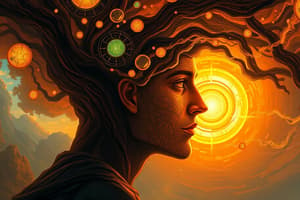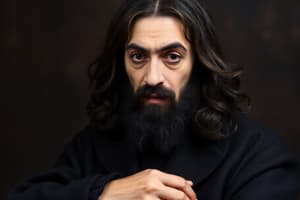Podcast
Questions and Answers
What prompts Descartes to begin the project of meditation?
What prompts Descartes to begin the project of meditation?
Descartes reflects on the amount of falsehoods he has believed throughout his life and begins by doubting everything he has ever known.
What is Descartes looking for in this project and why?
What is Descartes looking for in this project and why?
True knowledge that is undoubtable and can be considered true under circumstances of reason.
Under what conditions can Descartes carry out the project?
Under what conditions can Descartes carry out the project?
Meditations.
Since it is impossible for Descartes to consider all his opinions, how does he go about examining them?
Since it is impossible for Descartes to consider all his opinions, how does he go about examining them?
Where does Descartes start and why?
Where does Descartes start and why?
What is Descartes' method of doubt and how did he adopt it?
What is Descartes' method of doubt and how did he adopt it?
What are the three doubts Descartes raises about senses?
What are the three doubts Descartes raises about senses?
How do Descartes' arguments about dreaming and about an evil genius extend traditional doubts about the reliability of the senses?
How do Descartes' arguments about dreaming and about an evil genius extend traditional doubts about the reliability of the senses?
What does each doubt put into question, and what remains standing?
What does each doubt put into question, and what remains standing?
What does Descartes think he knows at the start of Meditation 2?
What does Descartes think he knows at the start of Meditation 2?
What does Descartes think follows from recognizing his doubts?
What does Descartes think follows from recognizing his doubts?
Study Notes
Meditation 1
- Descartes begins by doubting everything in pursuit of a more solid foundation for knowledge.
- His goal is to uncover true knowledge that is indubitable and can withstand rational scrutiny.
- He uses a method of doubt to evaluate the truths he has accepted, questioning the reliability of the senses.
Project Initiation
- The project is prompted by his reflection on the falsehoods he has believed throughout his life.
Method of Examination
- Unable to review all opinions individually, Descartes targets the underlying principles that inform his beliefs.
- The primary principle he challenges is reliance on sensory perceptions to verify truth.
Starting Point
- Doubting the senses leads him to recognize that they can be deceptive, particularly regarding distant or small objects.
Method of Doubt
- The method involves tracing knowledge back to a firm foundation of beliefs that are beyond doubt, aiming for certainty.
Three Senses Doubts
- Perceptual Illusion: Acknowledges temporary sensory deception based on distance or size, yet affirms that sensory knowledge is generally reliable.
- Vivid Dreaming: Challenges the distinction between dream sensations and waking experiences, emphasizing that sensory elements can arise from reality.
- Deceiving God and Evil Genius: Hypothesizes an evil demon that actively deceives him, allowing for the possibility that all he thinks he knows could be false.
Impact of Dreaming and Evil Genius Doubts
- These doubts highlight the unreliable nature of senses, as perceptions in dreams can mimic real-world experiences, with no clear markers to differentiate them.
Remaining Certainties
- While sensory reliability is questioned, the existence of God and the foundational belief in the self remain intact.
Meditation 2
- At the start of the second meditation, Descartes doubts the existence of everything, including senses and memory, questioning concepts like extension and movement.
Conclusion of Meditation 2
- Realizes that the act of doubting implies the existence of a self that doubts.
- Formulates the cogito argument: "I think, therefore I am," asserting that existence is guaranteed as long as he is the one contemplating doubts.
Studying That Suits You
Use AI to generate personalized quizzes and flashcards to suit your learning preferences.
Description
Explore Descartes' first meditation, where he systematically doubts his beliefs to establish a foundation for true knowledge. This quiz will challenge you to understand his approach to questioning sensory perceptions and the nature of certainty. Delve into the philosophical implications of doubt and knowledge.




